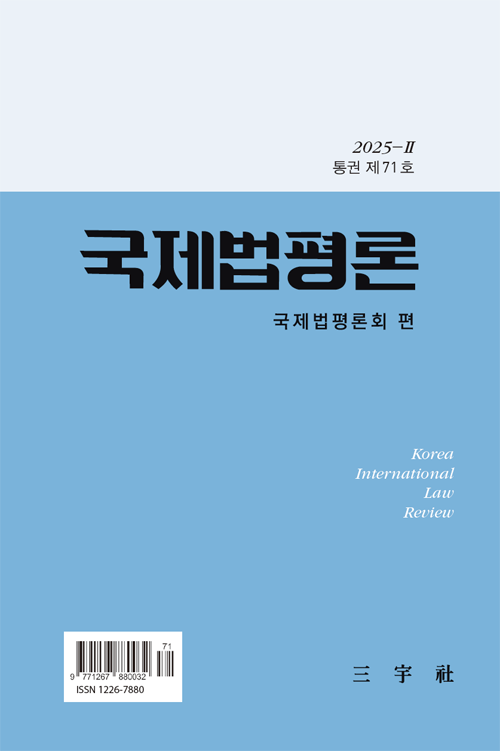- 영문명
- Family Reunification of Refugees under International Law
- 발행기관
- 국제법평론회
- 저자명
- 이지원(Jiwon LEE)
- 간행물 정보
- 『국제법평론』제71호, 87~101쪽, 전체 15쪽
- 주제분류
- 법학 > 법학
- 파일형태
- 발행일자
- 2025.06.30
4,600원
구매일시로부터 72시간 이내에 다운로드 가능합니다.
이 학술논문 정보는 (주)교보문고와 각 발행기관 사이에 저작물 이용 계약이 체결된 것으로, 교보문고를 통해 제공되고 있습니다.

국문 초록
The aim of this study is to conduct an analysis of refugee family reunification, a subject that has not been at the centre of active debate despite its practical and political importance. It also suggests ways forward for the future development of refugee policies in Korea. The study begins by defining the concept of ‘family reunification’ as distinct from that of ‘family unity’, by analysing the content of both concepts in various international instruments. Unlike the family unity, family reunification is not guaranteed in all cases. Because family reunification is involving the entry and residence of foreign nationals, and sovereign states exercise their exclusive right to allow foreign nationals to enter and leave their territory. However, family reunification is granted in some cases. One example is a child. The Convention on the Rights of the Child establishes the rights of family reunification of children.
What about refugees? There are no specific provisions concerning family reunification for refugees in the 1951 Convention relating to the Status of Refugees and the 1967 Protocol. However, the absence of such provisions in the Convention does not mean that the right to family reunification is not recognised as legitimate. Since it is practically impossible for refugees to enjoy the right to family life in their country of origin by virtue of the principle of non-refoulement, family reunification in the country of asylum may be the only means of ensuring respect for their family life. With regard to beneficiaries of international protection who are not refugees, it is considered inappropriate to base the possibility of being a sponsor for family reunification solely on their protection status.
Another significant aspect of family reunification is the scope of eligible family members. In the refugee context, it is generally recommended to adopt a flexible and broad interpretation of the term ‘family’. However, the reality in the family reunification is different. As far as spouses are concerned, the legality of the marriage is often a decisive criterion in determining eligibility for family reunification. In the case of marriages that are not universally recognised, such as polygamous marriages, same-sex marriages, and child marriages, it is essential to take account of the legal framework and cultural practices of the country of asylum. This approach is important that one of the main objectives of family reunification of refugees is their integration into the country of asylum. In the context of family reunification, minor children are generally eligible. However, exceptions may be made in specified circumstances. For instance, the eligibility of parents and minor siblings for reunification depends on whether the applicant is a child.
The discourse surrounding refugee family reunification has implications for the situation in South Korea. The legal basis for refugee family reunification under Korean law is set out in Article 37 of the Refugee Act. The main issues relating to the national implementation of refugee family reunification can be divided into two main areas: the eligibility of the sponsor and the scope of family members concerned. With regard to the eligibility of the sponsor, debates may arise as to the inclusion of individuals such as ‘humanitarian status holders’ who do not explicitly benefit from the possibility of family reunification under the current provisions of the Korean Refugee Act. The scope of family members concerned can be another problem. There are a number of complex issues, particularly with regard to spouses not recognised by national legislation or family members not explicitly mentioned in the Refugee Act. For example, if the sponsor is a child, their parents should be considered for family reunification, despite the Refugee Act only provides for spouses and minor children to be eligible for family reunification.
영문 초록
목차
Ⅰ. 서 론
Ⅱ. 난민 및 가족재결합의 개념
Ⅲ. 난민 가족재결합 내 주신청인의 지위
Ⅳ. 난민 가족재결합 내 가족구성원의 범위
Ⅴ. 난민 가족재결합의 국내 이행
Ⅵ. 결 론
키워드
해당간행물 수록 논문
참고문헌
관련논문
법학 > 법학분야 BEST
- 인공지능 판사, 과연 가능한가?
- 정치의 사법화와 사법의 정치화 : 온건하고 실용적인 헌법재판의 당위성
- 자국 우선주의 정책과 국제법상 난민⋅이민자 보호-트럼프 행정부의 미국 우선주의를 중심으로-
법학 > 법학분야 NEW
- [이탈리아]외국에서 받은 보조생식의료 시술로 이탈리아에서 출산한 자녀를 동성커플의 비생물학적 모의 법적 자녀로 인정하지 않는 법조항의 위헌성
- [프랑스]통행 및 체류 권리 확인을 위한 외국인 임시구금 절차에 식사할 권리를 규정하지 않은 것이 인간존엄성에 반하는지 여부
- 「국제비상경제권한법」(IEEPA)에 근거한 트럼프 대통령의 관세 행정명령의 합헌성 논쟁: 5.29.자 美국제무역법원의 위헌 판결 분석을 중심으로
최근 이용한 논문
교보eBook 첫 방문을 환영 합니다!

신규가입 혜택 지급이 완료 되었습니다.
바로 사용 가능한 교보e캐시 1,000원 (유효기간 7일)
지금 바로 교보eBook의 다양한 콘텐츠를 이용해 보세요!



